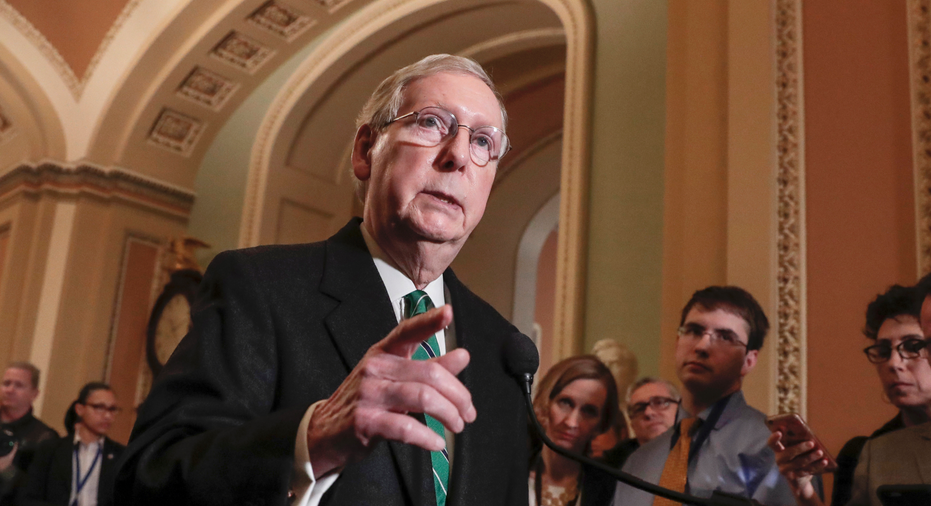McConnell wants hemp removed from controlled substance list

FRANKFORT, Ky. – The U.S. Senate's top leader said Monday he wants to bring hemp production back into the mainstream by removing it from the controlled substances list that now associates the crop with its cousin — marijuana.
Senate Majority Leader Mitch McConnell told hemp advocates in his home state of Kentucky that he will introduce legislation to legalize the crop as an agricultural commodity. The versatile crop has been grown on an experimental basis in a number of states in recent years.
"It's now time to take the final step and make this a legal crop," McConnell said.
Kentucky has been at the forefront of hemp's comeback. Kentucky agriculture officials recently approved more than 12,000 acres (4,856 hectares) to be grown in the state this year, and 57 Kentucky processors are helping turn the raw product into a multitude of products.
Growing hemp without a federal permit has long been banned due to its classification as a controlled substance related to marijuana. Hemp and marijuana are the same species, but hemp has a negligible amount of THC, the psychoactive compound that gives marijuana users a high.
Hemp got a limited reprieve with the 2014 federal Farm Bill, which allows state agriculture departments to designate hemp projects for research and development. So far, 34 states have authorized hemp research, while actual production occurred in 19 states last year, said Eric Steenstra, president of the advocacy group Vote Hemp. Hemp production totaled 25,541 acres (10,336 hectares) in 2017, more than double the 2016 output, he said.
The crop, which once thrived in Kentucky, was historically used for rope but has many other uses, including clothing and mulch from the fiber, hemp milk and cooking oil from the seeds, and soap and lotions. Other uses include building materials, animal bedding and biofuels.
Hemp advocates fighting for years to restore the crop's legitimacy hailed McConnell's decision to put his political influence behind the effort.
"This is a huge development for the hemp industry," Steenstra said. "Sen. McConnell's support is critical to helping us move hemp from research and pilot programs to full commercial production."
Brian Furnish, an eighth-generation tobacco farmer in Kentucky, has started making the switch to hemp production. His family will grow about 300 acres (120 hectares) of hemp this year in Harrison County. He's also part owner of a company that turns hemp into food, fiber and dietary supplements.
Furnish said hemp has the potential to rival or surpass what tobacco production once meant to Kentucky.
"All we've got to do is the government get out of the way and let us grow," he told reporters.
McConnell acknowledged there was "some queasiness" about hemp in 2014 when federal lawmakers cleared the way for states to regulate it for research and pilot programs. There is much broader understanding now that hemp is a "totally different" plant than its illicit cousin, he said.
"I think we've worked our way through the education process of making sure everybody understands this is really a different plant," the Republican leader said.
McConnell said he plans to have those discussions with Attorney General Jeff Sessions to emphasize the differences between the plants. The Trump administration has taken a tougher stance on marijuana.
The Department of Justice's press office declined to comment Monday on McConnell's pending legislation.
McConnell said his bill will attract a bipartisan group of co-sponsors. He said the measure would allow states to have primary regulatory oversight of hemp production if they submit plans to federal officials outlining how they would monitor production.
"We're going to give it everything we've got to pull it off," he said.
In Kentucky, current or ex-tobacco farmers could easily make the conversion to hemp production, Furnish said. Equipment and barns used for tobacco can be used to produce hemp, he said. Tobacco production dropped sharply in Kentucky amid declining smoking rates.
Furnish said his family has reaped profits of about $2,000 per acre for hemp grown for dietary supplements, better than what they've made from tobacco, he said.
Kentucky Agriculture Commissioner Ryan Quarles, whose great-grandfather grew hemp for rope to support the war effort in the 1940s, said he hopes hemp's legalization can "open the floodgates and we can see the true potential of this crop."
"We hope to position Kentucky to maximize the benefit of this crop once legalized, so the economic activity stays right here," he said.



















